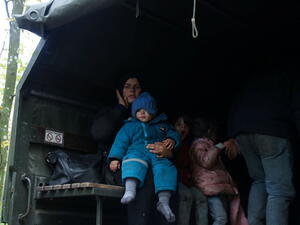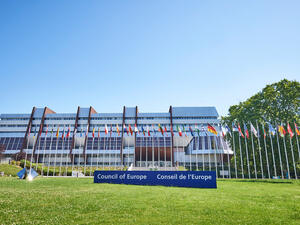European Union: reception conditions directive
European Union: reception conditions directive
UNHCR welcomes yesterday's adoption of a European Union directive on reception conditions for asylum seekers, which should ensure that most asylum seekers will receive a uniform package of benefits in both today's Europe and the Europe of the future.
While it would like to have seen more safeguards in certain areas, UNHCR recognizes that the new directive is an important step in bringing greater coherence to asylum policy in the European Union.
The European Council directive laying down minimum standards for the reception of asylum seekers in member states was announced in Luxembourg Thursday afternoon by the Justice and Home Affairs Council of the European Union. The directive, which will eventually be reflected in national legislation throughout all EU member states, contains some provisions that will result in an overall improvement in general reception conditions in several EU countries.
In particular, UNHCR is pleased to note the detailed sections of the directive regulating access to health care and education and the provision of identity documents and vital information on asylum procedures, including legal assistance.
In addition, there are important sections of the directive that require EU states to take special measures for vulnerable individuals, including victims of torture or violence, unaccompanied children, pregnant women and the disabled.
But UNHCR believes that certain aspects of the directive could actually lower standards in some countries. UNHCR feels the decision by the EU states not to harmonize the very different national policies and practices regarding access to employment is a drawback, particularly at a time when many states are talking about labour deficits and are also concerned about the costs of supporting asylum seekers through a sometimes lengthy asylum process. Not allowing asylum seekers - many of whom are talented and skilled professionals - to work is not beneficial to market economies. This view was supported by a recent study conducted by the Swiss government, which concluded that not only did giving asylum seekers the right to work not act as a pull factor, but that the employment of asylum seekers also acted as a significant positive contribution to the national economy.
UNHCR supports the EU harmonization process, which has set two key objectives - a common standard of protection and assistance for refugees and asylum seekers, and an improved asylum system that will benefit member states and their citizens.
UNHCR believes that a well-harmonized asylum system based on a common interest rather than on a state's individual domestic concerns would be of enormous benefit not only to the European Union itself, but also to future generations of refugees. A well-organized, streamlined system would alleviate the pressures caused by asylum seekers moving from state to state in search of better treatment.









